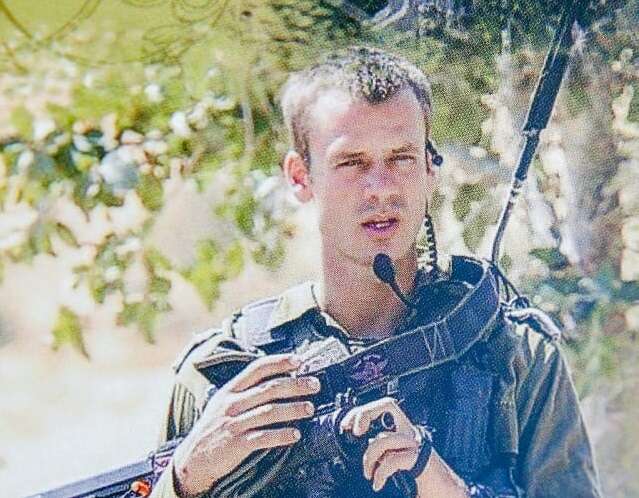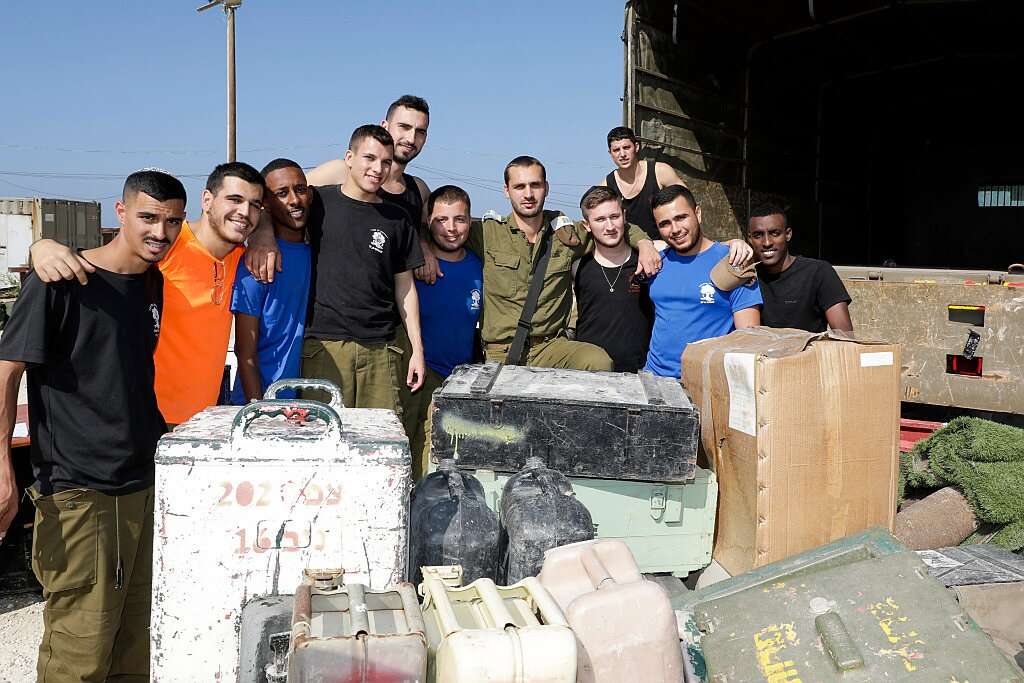
Brother of IDF Major who was Killed Follows in his Footsteps
By: Hanan Greenwood
This week, before the lead company of the Golani Brigade’s 13th Battalion left the Gaza Strip, Capt. David Sarel got up at 4 a.m., as he usually does, for another insanely busy day. At 9:30 a.m. an explosives device was found at the border fence, a suspicious vessel was spotted offshore at 11, and that was only the beginning.
On Monday, more than five after his brother Maj. Benaya Sarel was killed on Black Friday in Operation Protective Edge, David was getting ready to depart the most dangerous and volatile zone in Israel.
“I haven’t finished with Gaza,” David says. “This was a very challenging mission from every aspect – both in terms of the military combat and personally. This is the hottest zone in terms of ongoing security measures and daily missions. I don’t know if I can say if closes a circle, but I had the privilege of returning to the place where my brother was killed. It gave me a lot of strength and reminded me that I didn’t break, that my family didn’t break. We are going on.”
Q: How do you handle it? Do you look at Gaza every day and say, ‘This is where my brother was killed’?
“Not exactly, because most of the day I don’t think and I work like a well-oiled machine. But there are moments when you catch yourself, at morning or night, in the command center or on patrol, and suddenly you miss him.”
David Sarel had been in the army for only 12 days when he was informed that his brother had been killed. That same morning, Benaya had called him, but David couldn’t answer. Later, he was the one who opened the door to the local army liaison who brought him the life-changing news.

“It’s easy to think, in retrospect, what I would do differently, but that’s the way it is with every decision,” he says.
“I don’t regret the path I’ve followed, but I do regret that I suppressed what I was undergoing for so long. I went through something really tough and I chose to get back to my routine really quickly and continue with business as usual. Within two weeks, I was back to basic training with the Golani [Brigade], without any favors. Like everyone else. It helped me a lot at the time and centered me, but looking back I realize that I’m now dealing with a lot of things I had to work through then, and today the wounds are deeper.”
In the past five years, David has undergone a major process. He finished officers training successfully, served as a commander at the Golani Brigade’s commando school, then later as reconnaissance company commander. The past few months, he has been in charge of combat soldiers near Zikim on the southern coast, the northernmost part of the Gaza Strip – only a few kilometers from Ashkelon. On Monday, he and his soldiers left for training, and when that’s done, they are slated for operations in another very tense zone – Mount Dov, in the north.
David is full of praise for his troops: “We have Spartans who are protecting the people of Israel,” he says proudly.
“These are soldiers who are sacrificing their lives for them, very special people with a very strong sense of mission and devotion who handle this reality from a strong basis of values and combat spirit. It’s amazing to look at my company and realize that everyone here has a common goal, to protect the people of Israel.”

David’s father has only visited him on the Gaza border once.
“My dad happened to be here. I saw it was very hard for him,” David says.
Q: How did your parents respond when you told them you were headed for Gaza?
“My parents are heroes and are very adept at detaching some of their personal feelings and doing what needs to be done. I feel as if what I’ve chosen to do is hard for them in general, with the price they’ve already paid. They feel it every day. But at the same time, I’m sure that it also gives them a lot of strength.”
Q: May you live to 120, but if I were in place of your family, I’d automatically think of the family of Miriam Peretz, who lost two sons in battle. Isn’t that scary?
“No. I believe that every person has a role in this world. It’s scary to drive, to go out, or be in the country at all … Aside from that, I can say that if I am ever asked to go into a situation where I have to sacrifice my life, I’ll do it.”
Q: Do you feel that your story has made your service different? Something bigger?
“I don’t think I’m different from other people and the fact that my brother was killed doesn’t make my blood any bluer or give me any privileges. There are a lot of people who understand the importance and the value of devotion, and anyone who serves under me and around me is like that. Indeed, not everyone has paid such a heavy price. I’m motivated both by values and ideology, which are the main reason why I’m here, but it’s not just about values. You need to be good at what you do. I’m not here from a place of ‘poor me’ or ongoing suffering. I do it out of love, not out of a desire for revenge or because anyone is forcing me. Revenge is a very animalistic instinct, and it’s not what motivates me. I’ll do everything I can to defend Israel.”
David says he wanted to serve in Gaza: “I needed to bring that to a close.”
He is very honest, and doesn’t hide the fact that sometimes he has a hard time with the fact that his brother was killed only a few kilometers from where he has been serving.
“There’s something very sad about bereavement and grief: on one hand, a hole opens up, but on the other, with time a little sprout grows in that hole that softens the loss, kind of heals the wound. I admit that I’m kind of in denial about what happened, because I can say that if I focus on it, I won’t be able to do what I do. I funnel the sorrow, the pain, the loss into action.”
Q: Do you ever break down?
“Yes. I break a few times a day, but they’re little breaks and I know that every one of them also comes with an uplift in spirit. I always remind myself why that’s important. And when I look to my left and to my right and see the soldiers and commanders, when I look back and see the people of Israel backing us up, when I look at my family and my wife, my home and this country, I don’t have any more questions.”
David is very frank about his feelings, and hides nothing. Not even things that aren’t easy to hear. He sees that as carrying on Benaya’s values and legacy.
“He was a legend, in life and in death, and I never go anywhere and tell people my last name without them telling me where he met them while he was alive. It warms my heart, and his memory has to guide me to a place of action.
“If I can touch one or two people, give them something and cause them to do something meaningful, the way Benaya would, then I’ve done what I had to – even if it demands a lot of effort and spiritual strength.”


